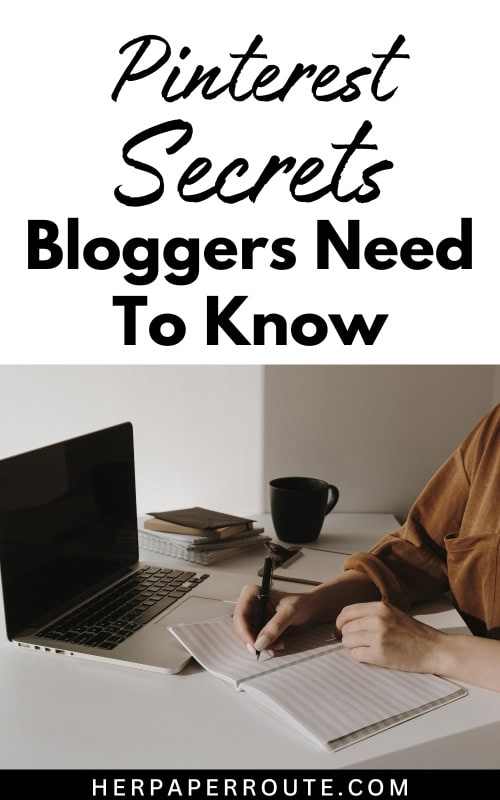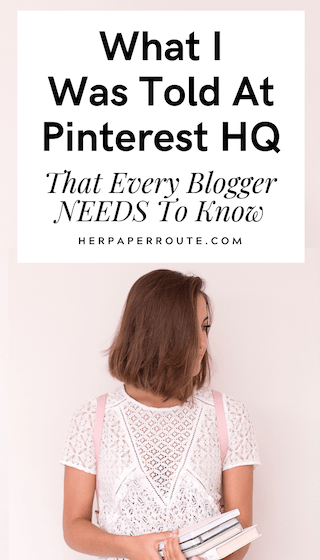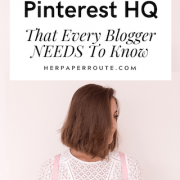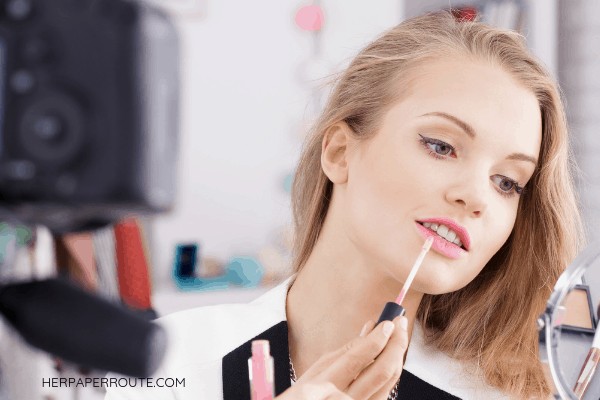Secrets Pinterest Told Me, Bloggers Need To Know

I recently had a meeting with Pinterest to ask some questions that we (bloggers) have been wanting to know. And what Pinterest told me was very interesting!
Since 2017 Pinterest has had a lot of changes. From growing to more than 300 million monthly users, to going pubic and making major waves with their PPC ads (called Promoted Pins.)
As an affiliate partner of various brands and sponsored content, HerPaperRoute may earn commission on qualifying purchases. Disclaimer
But with all the changes, come many unknowns. And there is a lot of hearsay mumbling around the blogging community about Pinterest… often from non-official sources.
So I reached out to Pinterest HQ to find answers to some of the most burning questions on everyone’s minds.
What Pinterest Told Me – 5 Explosive Revelations That Bloggers Need To Know
Pinterest is a fantastic tool for growing blog traffic, when you know what to do. I have shared many crucial Pinterest marketing tips that have helped thousands of bloggers, if you’d like to check that out first.
As content creators, we want to know how we can get the most out of the platform, and use it to its full potential.
We want to be successful on Pinterest and we don’t want to do anything that would negatively affect our results there.
It is no secret that many bloggers have been finding it more and more difficult to rank on Pinterest, than they used to, pre-2017.
Why is this? In a recent meeting with Pinterest, I asked how we can best get our pins to rank, and got to the bottom of a few rumors.
So, here’s what I learned, that I think you will find helpful!
Before you read on, make sure you scoop up a free copy of my magic Pinterest planner tool!
1. Why are so many good bloggers getting suspended?
It is an unfortunate reality that it is all too common for bloggers to find that their Pinterest accounts have been suspended out of the blue for spam.
When they never did anything spammy at all.
I asked the Pinterest rep why this keeps happening to non-spam accounts and what can be done.
Here’s what Pinterest told me:
She said that she is completely aware of this issue, and it’s “crazy” how often they get suspension appeal requests, and when they look at the account there was nothing wrong with the account or the Pinner’s activity at all.
The suspensions are from an automated system, and good accounts can get mixed up with the actual spam accounts.
Takeaway
Don’t panic if you discover that your Pinterest account was suspended overnight. There is a good chance that it was a mistake, and you can recover it.
I wrote about this in more detail and shared tips for what you can do to avoid having your account suspended here.
2. When Ranking Pins, Does Pinterest Factor In Your Website’s Page Speed And Bounce Rate?
When a pin is clicked, it leads to a website. If Pinterest looks at the website, do they look at its content? Pop-ups? Ads?
The reason for wondering this is because I wonder if Pinterest takes into consideration a website’s page load time, when ranking how well a pin will do.
Here’s what Pinterest told me:
I was told, “No, Pinterest doesn’t.”
But, she added, “The only thing to consider here is the Pinner journey – if a pin leads a Pinner to a page that is taking forever to load or to a website that isn’t so appealing to the eye, it could be a quick bounce rate on the Pinners end.”
So, this explanation may need further deciphering. No, they don’t take page load time into consideration when ranking a pin, but yes, a slow loading page would affect the Pinner journey.
Pinterest wants to give Pinners the best journey and experience. The person who clicked the pin (the Pinner) would bounce off the page quickly, if their experience on said page was poor.
So if people are bouncing back to Pinterest quickly, they wouldn’t really be having the best experience reading the content that Pinterest is recommending to them, right?
That action, it would seem would signal that the article or the website itself isn’t high-quality. And that action would factor into the ranking of a pin.
Take away:
Make it your goal to make site visitors stay and spend time on your page when they land there. How?
- You should optimize your website to load fast (read this for tips on increasing website speed)
- Use a good caching plugin like WPRocket
- Optimize your images with ShortPixel (big images are the #1 cause of slow websites)
- Make sure your website “looks appealing” Use a premium theme, don’t have hard to read or small fonts, have a clean layout.
- Always write an enticing intro at the beginning of every blog post, that hooks people in to want to stay and read more.
3. Is there more weight given to repins (saves) from business accounts rather than personal?
Let’s say you have a new pin. Today it got repinned by someone using a personal Pinterest account. It also got repinned by another person, using a Pinterest business account.
Did the repin from the business account help give the pin a higher ranking for impressions, than the repin by the personal account user?
Here’s what Pinterest told me:
“A business account isn’t prioritized over a personal account.”
She then went on to say that “The reason a business account might do better is if it has more followers or a stronger presence on Pinterest. Getting a stronger presence can come from being active on the platform and/or promoted content which will get you a lot more reach than organic posting.”
Read that over again. Being active on the platform and/or promoted content will get you a lot more reach than organic posting.
We already know that promoted pins get priority impressions over organic posting. That makes sense.
But being active on the platform…will get you a lot more reach than organic posting is something to take note of.
What then is being active on the platform, if that isn’t part of “organic posting?” Some may assume that manually pinning on the platform is being active.
But, it sounds like there is more than just pinning, that accounts for having a strong presence on Pinterest these days.
What you do on the platform, beyond just pinning and what other people do related to your content/your account is important.
It has also been argued in the past that followers on Pinterest ‘don’t matter’ but I have said again and again that followers DO matter on Pinterest.
As your followers are the ones who see your pins first (before they start ranking in search) and I have suggested that it’s those followers who help or deter your pin from ranking well or not, depending on how they interact with it.
By saying that “The reason a business account might do better is if it has more followers” Pinterest has pretty much confirmed that followers do, in fact, matter.
Takeaway:
Following others, repinning other people’s content, growing your own followers, commenting on other people’s pins, and having other people comment on your pins should all be a focus right now.
Be present on the platform, engage with others and work to grow your followers. These things will all increase the strength of your presence on Pinterest, and as a result, increase the life of the content you share.
Promoted pins are given more impressions above organic. Use this to your advantage and start using them.

4. Has Something Changed, That Is Making Pins From Schedulers Decrease In Performance?
Over the past year, this has been coming up more and more in the blogging community. Bloggers are questioning if schedulers that auto re-pin pins limit a pin’s full chances of impressions.
Bloggers love using Tailwind, which is a third-party scheduler approved Pinterest partner. It offers many helpful trafic-boosting features such as my beloved Tailwind Tribes!
But one of its features is SmartLoop, a tool that saves and resaves pins automatically to your boards as evergreen recycled content. An act that some people have been wondering about. Does Pinterest limit the reach of Tailwind SmartLoop pins?
Here’s what Pinterest told me:
When I chatted with the rep at Pinterest, I asked this question and right away she knew what I was talking about. She said that some advertisers have been asking them about this, too. She confirmed that no, there is nothing that Pinterest has done on their side to lower reach for accounts using Tailwind.
Takeaway:
It’s good to hear that Pinterest isn’t specifically lowering the lifespan of pins from schedulers. Something else could be going on, yet. It seems that there is a consensus that people have noticed a drop in impressions and are wondering if it has anything to do with their evergreen recycling of pins but there is no proof at this time.
A few months ago I turned off my SmartLoop, and focused more on pinning to my Tailwind Tribes.
Since I have been more focused on Tribes, my impressions have gone up. As that would be expected because Tribes offers real-time organic traction from real people. But I really don’t know if turning off SmartLoop had anything to do with it or not.
So, at this time we just aren’t sure. If SmartLoop helps you, keep using it! If you haven’t spent much time in your Tailwind Tribes lately, go and be active in them today.
- We know that Pinterest loves fresh new content, and new pins will get priority over stale, overly-repinned ones anyway. Regardless of whether you are using a scheduler or not, always make sure your main focus is adding quality new content.
- So with that, its more likely that any drop in impressions from re-pinned pins is just Pinterest naturally giving priority to new pins over old pins, regardless of whether you used SmartLoop or not.
I would recommend you continue to create fresh pins regularly and continue pinning quality content overall. That’s really the most important thing.
5. Should You Stick To One Niche, Or Can You Post Various Content Without It Affecting Your Ranking On Pinterest?
Let’s say you are doing well, ranking pins in one category feed. And you typically pin content in just that one niche, and then one day you start pinning something in a completely different niche.
You are trying to start ranking pins in a completely different category feed. Will this confuse Pinterest? Will it decrease your ranking in the first category? Does it even matter or not at all?
Here’s what Pinterest told me:
For this question, it seems there isn’t an answer, at least not yet. Pinterest told me that they are “Not sure about (switching to a different niche)” And that there isn’t any solid evidence around that either way.
Takeaway
Personally, I have pins ranking in different categories, and I don’t stick to just one niche.
Although the majority of what I pin is related to entrepreneurship, I also pin fashion, finance, creative arts, and even general mom life stuff.
At this time I don’t think it hurts your ranking in one category feed to rank in a completely different one.
But I will update this if I gain any new evidence to support this. At this time, it’s just my assumption that it’s A-Ok to not stick to just one niche of content.
More Pinterest Resources
Get a free Pinterest Marketing book today, with tips on how to create viral pins, step-by-step.
Get your free copy of the book now by letting me know where to send it.
Pin this!

Follow along on Instagram!











